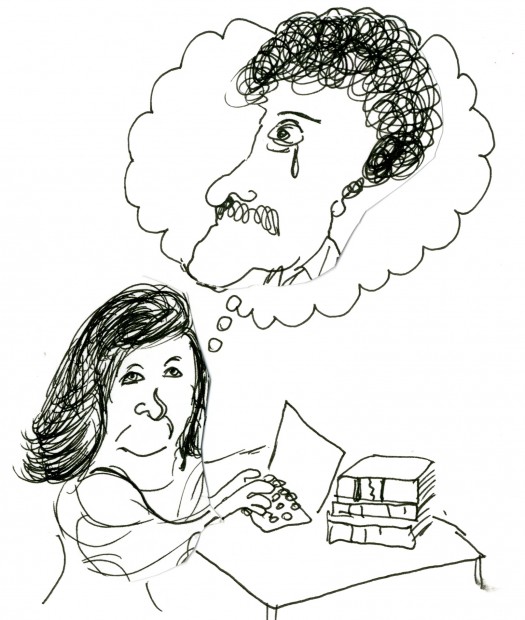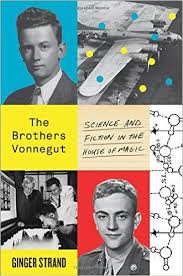Bad Advice Wednesday: Get Thrown Out of Libraries
categories: Cocktail Hour
1 comment

By special guest Ginger Strand:
I only cried twice at the Lilly Library while researching my new book The Brothers Vonnegut. Indiana University’s beautiful archive has most of Kurt Vonnegut’s early drafts and letters, and I visited it several times while working on the book. The first time I cried was when I was going through a box of miscellaneous stuff and Kurt Vonnegut’s passport popped out. There he was, smiling up at me with that self-ironic grin. Overwhelmed with a sudden sense of loss, as if I had known him personally, I burst into tears. This never fails to draw furtive glances from fellow readers and concerned stares from reading room staff fearful you might do some harm to the paper.

The second time was on another visit, when I was reading letters Kurt wrote to his daughter Nanette during his separation from her mother. The letters were so raw, so real, so filled with the agony of failed marriage and the confounding anxieties of parenthood, that I couldn’t help weeping as I read them. I soldiered on that way for a while, reading and sniffling, but eventually I did step outside to collect myself. I myself feared I might do some harm to the paper.
I always seem to be the only one weeping in the archive. Or doing a happy dance when I discover something great. (I try to disguise it as standing up to stretch.) Or giggling. There was one point when I was researching my first book of nonfiction, Inventing Niagara, when I thought I might be forcibly ejected from the American Antiquarian Society for giggling. I was reading some very early accounts of explorers in the New World, and they were hilarious. Other readers were glancing over. The American Antiquarian Society, a national research library housed in a Colonial revival building in Worcester, Mass., is a rather formal archive, with scads of rare books and periodicals, and scads more rules and regulations about how you may interact with them. You sit in a grand, paneled reading room with portraits—founders presumably—glaring down on you. You wear white gloves if you’re handling anything delicate and you can’t so much as go to the bathroom without getting what amounts to a hallway pass from the reading room staff.
None of this is unusual. In fact, the AAS insists they are actually rather relaxed in their protocols. Whatever. All I know is that when I read an account of two French explorers actually running into each other in the woods—as if the so-called undiscovered continent was so lousy with French explorers you couldn’t toss a beaver without hitting one—I laughed out loud. And the historian sitting at the desk next to mine threw down his regulation pencil in disgust and said, “I give up. Just tell me what’s so damn funny.”
I remain unrepentant. Archives look and act like dry, stuffy, hidebound places, mausoleums for stashing history’s corpse. But in fact, they are wild, glorious places packed with drama and intrigue and sex and scandal—in short, with stories. And not enough writers take advantage of them. Archives are the backrooms of history’s rave—the place where you get to rub up against total strangers and dive blindly into uncharted territories. And we writers have pretty much ceded this party to scholars and academics. Well we shouldn’t.
Wade into the archive, I say, and though you have to check your snacks and pens and coffee cups and coats and backpacks at the door, don’t check your emotions. The richness of human life deserves your empathy. Laugh, sigh, groan, weep, marvel. Make a spectacle of yourself. Get kicked out. Get walked to the door. Stagger out, still marveling, into the daylight with a story clenched in your teeth. Then share it with the rest of us, so we can marvel too.


now that’s an antidote to this past week, for me at least. very, very good 🙂